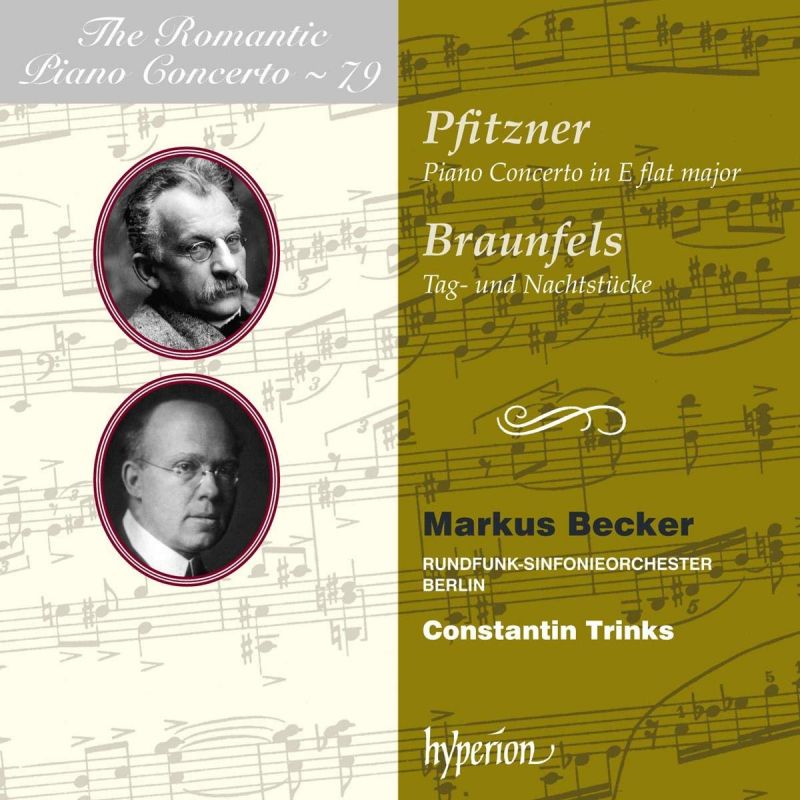BRAUNFELS; PFITZNER The Romantic Piano Concerto Vol 79
View record and artist detailsRecord and Artist Details
Composer or Director: Walter Braunfels, Hans (Erich) Pfitzner
Genre:
Orchestral
Label: Hyperion
Magazine Review Date: AW2019
Media Format: CD or Download
Media Runtime: 74
Mastering:
DDD
Catalogue Number: CDA68258

Tracks:
| Composition | Artist Credit |
|---|---|
| Concerto for Piano and Orchestra |
Hans (Erich) Pfitzner, Composer
Berlin Radio Symphony Orchestra Constantin Trinks, Conductor Hans (Erich) Pfitzner, Composer Markus Becker, Piano |
| Tag- und Nachtstücke |
Walter Braunfels, Composer
Berlin Radio Symphony Orchestra Constantin Trinks, Conductor Markus Becker, Piano Walter Braunfels, Composer |
Author: Rob Cowan
The lovely third movement suggests further parallels, most obviously with the sublime beauty of Pfitzner’s operatic masterpiece Palestrina but turning again to Brahms’s Second Piano Concerto, the latter’s slow movement, especially the piano-writing from 3'27" (the soloist’s first entry). Here Becker is the restrained classicist against Barto the romantic, whereas in the finale’s opening pages he’s the more playful of the two, lending the music a delectable lilt (just as he did to Reger’s finale – AVI Music, 5/19). Prior to the concerto’s close there’s a virtuoso cadenza where both pianists deliver handsomely.
If pressed to choose I’d opt for Becker and Trinks, principally because of the way they balance the sum of the concerto’s substantial parts, and their generally superior recording. Also, don’t forget Walter Gieseking’s grandly stated wartime performance – Gieseking was a noted champion of the piece.
As to couplings, Thielemann chooses Busoni’s Symphonic Nocturne and Reger’s memorable Romantic Suite for a two CD release that, as Guy Rickards pointed out in his favourable review, could easily have been accommodated on a single disc. Hyperion interestingly treats us to what I presume is the first commercial recording of Walter Braunfels’s five-movement Tag- und Nachtstücke ‘for orchestra with piano obbligato’, music that dates from the early 1930s but wasn’t actually performed until summer 2017 (under Peter Ruzicka). Like most of Braunfels’s music that I’ve heard, it suggests a combination of profundity and play, being thematically pleasing, consistently inventive and very skilfully scored. There are times when the composer hints at progressive climes that Pfitzner doggedly resisted (Mahler is a distant presence), which makes Hyperion’s decision to place it alongside the concerto particularly valuable. An extremely fine release.
Discover the world's largest classical music catalogue with Presto Music.

Gramophone Digital Club
- Digital Edition
- Digital Archive
- Reviews Database
- Full website access
From £8.75 / month
Subscribe
Gramophone Full Club
- Print Edition
- Digital Edition
- Digital Archive
- Reviews Database
- Full website access
From £11.00 / month
Subscribe
If you are a library, university or other organisation that would be interested in an institutional subscription to Gramophone please click here for further information.




